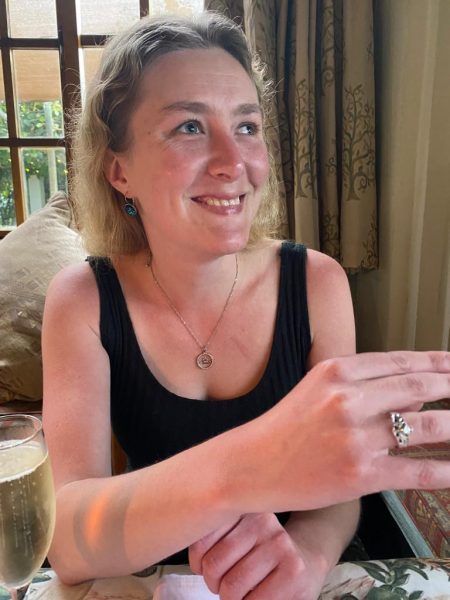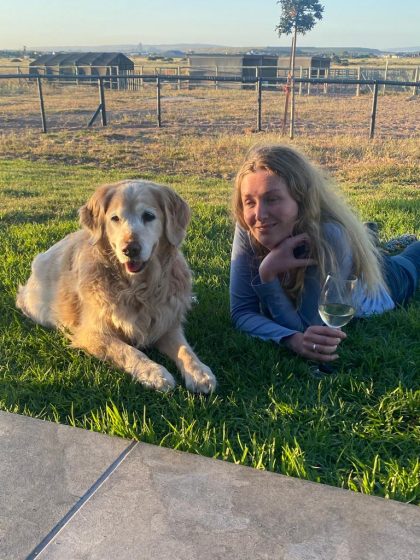Last week, I mentioned how often people make comments to my partners about how kind or brave they are for dating a disabled person. Their response to this is that they don’t see it as a burden. They see it as a privilege to be dating me. Well, I’m flawed, so it isn’t always easy. But as I said in my previous article, this has nothing to do with my disability. I offer as much as my partners do in the relationship, and I am not reliant on them. So let’s talk about disabled dating a little bit more.
I’m a little like a South African Taylor Swift. “I’ve got a blank space baby, and I’ll write your name.” I write songs about my exes, and I’ve been called a serial monogamist, meaning that I have had very long relationships (often spanning years) that have ended. But eh, that’s alright, it’s only the last one that lasts, isn’t it?
I have dated both disabled and nondisabled people, and both types of dating have different nuances. Dating a fellow blind person means that you have to Uber everywhere, and you can’t help each other with tasks that require sight, but it would have been exactly the same if I had been single, and I’m perfectly capable of living alone. The cool thing about dating a blind person for me, is that they understand my daily experiences and my frustrations in a way that no nondisabled person can.
On the other hand, I don’t find it difficult to date a nondisabled person, as long as that person is open minded, and doesn’t try to wrap me in cotton wool. Of course, there are practical aspects that come into play, in the sense that the sighted partner can help me when I drop something and can’t find it, can drive the two of us places, and of course it makes shopping a whole lot easier. This isn’t a clinical weighing up of advantages and disadvantages though. It’s the individual, and the way you click that truly matters.
One myth that I would definitely like to dispel is that disabled girls are easy. Think of Howard in The Big Bang Theory, when he and his friends were in a bar trying to pick up women. He says his strategy is to allow the jocks to thin out the crowd until only “the old, the sick and the lame” are left. He says “Oh, and if you spot a chick with a Seeing Eye dog, she’s mine.”
Howard shows a lot of character growth in the series going forward, but at this point he was still a bit of a creep. His comment was a reflection of who the character is at this stage, so I don’t blame the show for it. However, what might have been a better portrayal of stereotypes vs the reality of disabilities and dating would have been if Howard did actually approach the girl with the guide dog and she turned him down, or if she was shown leaving with an attractive man (or woman).
Disabled women (and disabled people of any gender) are not desperate. Many of us are attractive, or at least perfectly comfortable in our own skin, and many of us do not find it difficult to meet dates or partners who find us appealing. Society’s view of what constitutes an attractive body is skewed anyway.
Incidentally, a better portrayal of disability stereotypes in The Big Bang Theory was when the character Raj was dating a deaf girl, and Leonard was worried that she was using him for his money. Penny says to him: “Handicapped people are nice, Leonard. Everyone knows that.” It’s a common stereotype that if you’re disabled, you can’t possibly be amoral. However, later on we see that Raj’s girlfriend does turn out to be a gold digger, so Penny was proven wrong.
On that note, I’ve often heard comments along the lines of “since you can’t see, you must be so much less shallow than the rest of us! You must go entirely on someone’s personality.” This is not true. Blind people can be as shallow as anyone else. Although I like to believe that I primarily choose partners based on personality, I have to admit that there are certain body types, for example, that I find more attractive than others. I notice things like this by holding onto someone’s arm, or giving them a hug. Even hearing where someone’s voice comes from gives a good idea of their height. And speaking of voices, I melt for a man with a gorgious voice. I don’t mean he has to be able to sing, but he has to have a voice I like, or we’re unlikely to get to the next level. It can so happen that I meet someone, start liking them due to other factors, then actually start liking their voice after I’ve started liking the other aspects, but a nice voice is often one of the first things that attract me to people.
At any rate, on to my next point. If you’re ever on a first date with a blind person, you’re not being helpful and romantic if you offer to let them touch your face. The media loves this trope. It pops up in music videos, movies and shows all the time. Blind people generally do not go around sensitively touching people’s faces. It’s just weird, man! Especially during Covid times, it’s not a good idea anyway. Yes, of course I’ve touched the faces of my partners, but it is in the same way that a sighted person in a relationship probably has touched their partner’s face. It only happens once you’re a lot more intimate than having just met and gone on a first date.
If you plan to go on a date with a disabled person, the main thing to remember is to ask, not just do. Perhaps a blind person wants to walk alone with their guide dog, but they might appreciate if you offer to guide them by letting them take your elbow. Do not grab them by the shoulders and steer though. We’re not cars! Same goes for wheelchair users. They will ask if they want to be pushed.
In addition, don’t leave your blind date in the middle of an open area while you do something else, because that can be disconcerting and they will feel in the way. Maybe show them a chair or table, or whatever. Also definitely tell them if you’re going somewhere, because it’s embarrassing to be seen “talking to ghosts” as I call it, not realising that the person I’m with is not there.
Sure, it’s gentlemanly to pull out a girl’s chair, but tell her if you do so, or she might assume it’s there, sit down, and make an intimate connection with the floor instead of with you. This has actually almost happened to me.
When it comes to dinner conversation, don’t be scared to ask about your date’s disability, but also make sure that isn’t the only topic of conversation. Remember, they’re used to being asked about it all the time, and it gets tedious. Get to know the person, not just the disability.
If you find that the waiter is insisting on addressing you when they are talking about your disabled date’s order (this happens all the time), tell them to speak directly to the disabled person. We can speak for ourselves, and we don’t bite!
Dating apps are also an interesting topic of conversation when it comes to disabled people and dating. Tinder is quite inaccessible with a screen reader, but I have a friend who uses Bumble. He says that two of the most frustrating experiences for him are when there is only a picture and no profile description (he immediately swipes left when he sees this) and also when people ghost him immediately when they find out he’s disabled. On the bright side, he has recently met a lovely girl, and after much conversation and a few very successful dates, they are now in a relationship.
Finally, it would be remiss of me if I didn’t say something about the movie Me Before You. This movie is a mine field when it comes to portraying disability in a way that creates completely wrong perceptions of disability. I’m not going to go into the “assisted suicide is fine when it comes to disabled people, because their lives must be so terrible” rhetoric right now. It goes beyond the scope of this article, and I will address it in another. However, there’s a scene in which the disabled male lead tells Emilia Clarke’s character that he doesn’t want to sleep with her, because she could have so much better, and he doesn’t want that to be her memory. This is utter bullshit (forgive my language). I’m not saying there aren’t disabled people who have internalised ableism, and it’s fair to portray those people in literature and TV, but right now it just sends completely the wrong message.
Speaking for myself, for my disabled friends, and for many disabled people I’ve met and liked, you’d be lucky to have us. A life with a disabled partner is not half a life. It could be an incredibly rewarding one. Next time you meet a disabled person that you’re attracted to, why not (respectfully) ask to get to know them, then perhaps ask for their number, and maybe, just maybe, if they like you back, you might embark on one hell of an interesting and fun journey.

